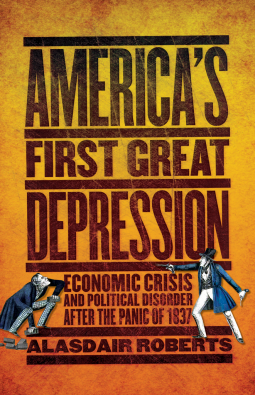
America's First Great Depression
Economic Crisis and Political Disorder after the Panic of 1837
by Alasdair Roberts
This title was previously available on NetGalley and is now archived.
Send NetGalley books directly to your Kindle or Kindle app
1
To read on a Kindle or Kindle app, please add kindle@netgalley.com as an approved email address to receive files in your Amazon account. Click here for step-by-step instructions.
2
Also find your Kindle email address within your Amazon account, and enter it here.
Pub Date Apr 17 2012 | Archive Date Sep 01 2012
Description
For a while, it seemed impossible to lose money on real estate. But then the bubble burst. The financial sector was paralyzed and the economy contracted. State and federal governments struggled to pay their domestic and foreign creditors. Washington was incapable of decisive action. The country seethed with political and social unrest. In America's First Great Depression, Alasdair Roberts describes how the United States dealt with the economic and political crisis that followed the Panic of 1837.
As Roberts shows, the two decades that preceded the Panic had marked a democratic surge in the United States. However, the nation's commitment to democracy was tested severely during this crisis. Foreign lenders questioned whether American politicians could make the unpopular decisions needed on spending and taxing. State and local officials struggled to put down riots and rebellion. A few wondered whether this was the end of America's democratic experiment.
Roberts explains how the country's woes were complicated by its dependence on foreign trade and investment, particularly with Britain. Aware of the contemporary relevance of this story, Roberts examines how the country responded to the political and cultural aftershocks of 1837, transforming its political institutions to strike a new balance between liberty and social order, and uneasily coming to terms with its place in the global economy.
Advance Praise
"For the first 50 years after achieving independence, Americans had every reason to believe theirs to be the most fortunate of nations. Then came the Panic of 1837, which caused a hopelessness rendered worse by the optimism that had preceded it and resulted in a crisis that lasted until 1848. The analysis by Suffolk University Law School professor Roberts (The Logic of Discipline) reveals how this disaster led to epochal shifts in policy and culture, and his lively narrative and commitment to character ensure that the human cost is never out of sight. Roberts is especially keen to demonstrate how this mid-19th century ordeal relates to America’s current woes. The “hard times” of the 1830s led to financial ruin for state governments, a near-cessation of federal aid, and an outbreak of violent protests in many major cities. For Roberts, though, the most relevant parallel by far is the relationship between the U.S. and its primary foreign creditor: Great Britain. If today’s commentators worry about a growing Chinese threat, during the 19th century British ascension was an established fact; its military had no rival and its investors and industry served as 'the real engine of American development.' This timely work suggests that the U.S. has spent more time as a global underdog than as an undisputed hegemon." — Publishers Weekly
"Alasdair Roberts tells a wide-ranging story of the depression that began in 1837 with lucidity, emphasizing the role of global financial markets and finding plenty of analogies to the economic problems of today."—Daniel Walker Howe, Pulitzer-Prize-winning author of What Hath God Wrought: The Transformation of America, 1815–1848
“America’s First Great Depression is an intriguing history of American financial policy in the 1830s and 1840s. Alasdair Roberts’s contention that international financial considerations shaped U.S. policymaking is well sustained, the writing is sprightly, and the argument is nicely documented with a wealth of judiciously culled evidence.”—Richard R. John, Columbia University, author of Network Nation: Inventing American Telecommunications
"America's First Great Depression is astute, compelling, concise, original, relevant, transatlantic, well-written, and witty. No ellipses and no exaggerations." —Robert E. Wright, Nef Family Chair of Political Economy, Augustana College, South Dakota, author of One Nation Under Debt and Fubarnomics
Available Editions
| EDITION | Other Format |
| ISBN | 9780801450334 |
| PRICE | $35.00 (USD) |
| PAGES | 264 |



